Analyzing Erikson's Psychosocial Theory of Human Advancement
VerifiedAdded on 2022/09/28
|13
|2966
|100
Essay
AI Summary
This essay provides an overview of Erik Erikson's psychosocial theory of human development. It outlines the eight stages of psychosocial development, starting from infancy (trust vs. mistrust) through to maturity (ego integrity vs. despair). Each stage is characterized by a specific psychosocial crisis that individuals must resolve to develop a healthy personality. The essay details each stage, including autonomy vs. shame and doubt, initiative vs. guilt, industry vs. inferiority, identity vs. role confusion, intimacy vs. isolation, and generativity vs. stagnation. The paper emphasizes the social aspects of personality development, highlighting the influence of parents, community, and broader societal factors. The essay also discusses the implications of successfully or unsuccessfully navigating each stage and concludes by summarizing the importance of Erikson’s theory in understanding human development.
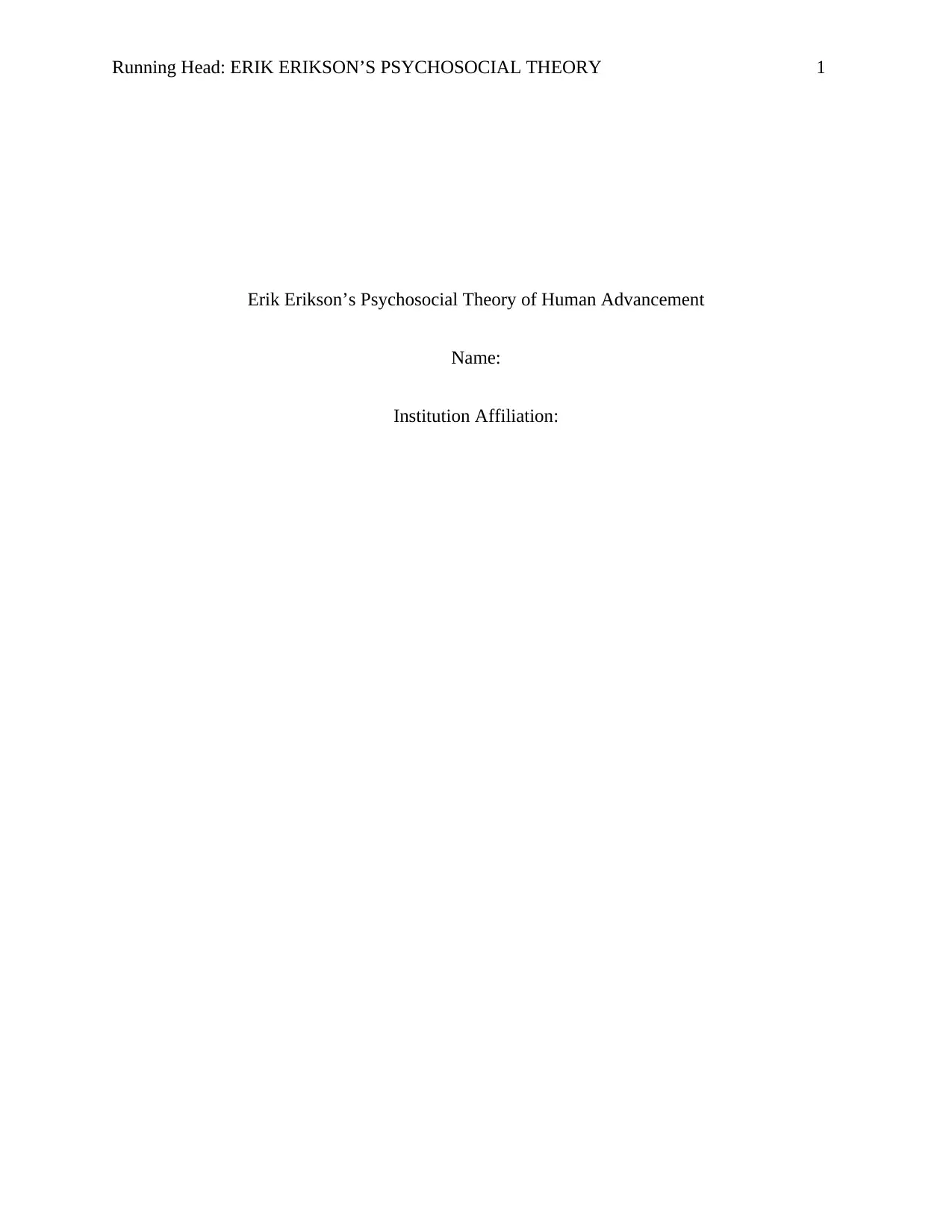
Running Head: ERIK ERIKSON’S PSYCHOSOCIAL THEORY 1
Erik Erikson’s Psychosocial Theory of Human Advancement
Name:
Institution Affiliation:
Erik Erikson’s Psychosocial Theory of Human Advancement
Name:
Institution Affiliation:
Paraphrase This Document
Need a fresh take? Get an instant paraphrase of this document with our AI Paraphraser
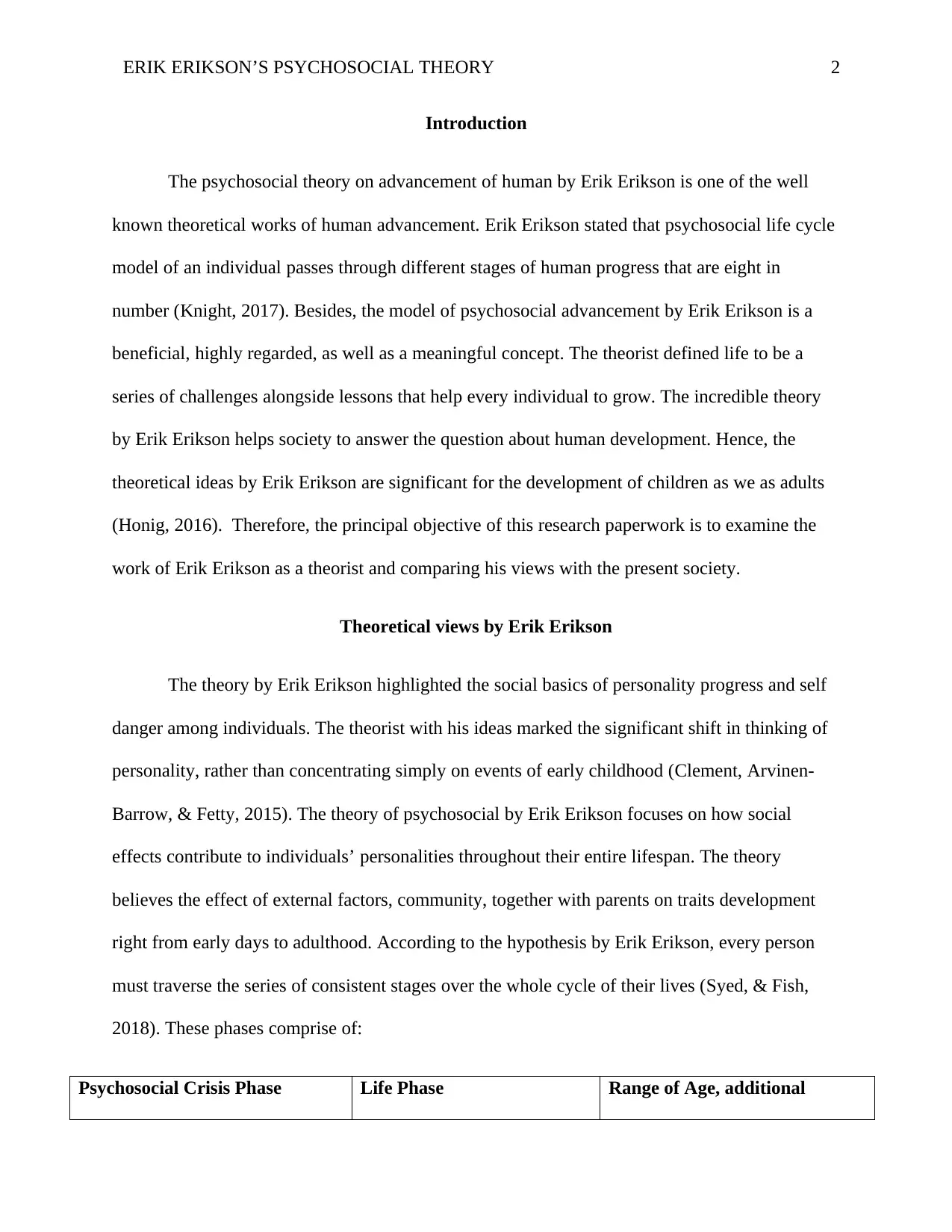
ERIK ERIKSON’S PSYCHOSOCIAL THEORY 2
Introduction
The psychosocial theory on advancement of human by Erik Erikson is one of the well
known theoretical works of human advancement. Erik Erikson stated that psychosocial life cycle
model of an individual passes through different stages of human progress that are eight in
number (Knight, 2017). Besides, the model of psychosocial advancement by Erik Erikson is a
beneficial, highly regarded, as well as a meaningful concept. The theorist defined life to be a
series of challenges alongside lessons that help every individual to grow. The incredible theory
by Erik Erikson helps society to answer the question about human development. Hence, the
theoretical ideas by Erik Erikson are significant for the development of children as we as adults
(Honig, 2016). Therefore, the principal objective of this research paperwork is to examine the
work of Erik Erikson as a theorist and comparing his views with the present society.
Theoretical views by Erik Erikson
The theory by Erik Erikson highlighted the social basics of personality progress and self
danger among individuals. The theorist with his ideas marked the significant shift in thinking of
personality, rather than concentrating simply on events of early childhood (Clement, Arvinen-
Barrow, & Fetty, 2015). The theory of psychosocial by Erik Erikson focuses on how social
effects contribute to individuals’ personalities throughout their entire lifespan. The theory
believes the effect of external factors, community, together with parents on traits development
right from early days to adulthood. According to the hypothesis by Erik Erikson, every person
must traverse the series of consistent stages over the whole cycle of their lives (Syed, & Fish,
2018). These phases comprise of:
Psychosocial Crisis Phase Life Phase Range of Age, additional
Introduction
The psychosocial theory on advancement of human by Erik Erikson is one of the well
known theoretical works of human advancement. Erik Erikson stated that psychosocial life cycle
model of an individual passes through different stages of human progress that are eight in
number (Knight, 2017). Besides, the model of psychosocial advancement by Erik Erikson is a
beneficial, highly regarded, as well as a meaningful concept. The theorist defined life to be a
series of challenges alongside lessons that help every individual to grow. The incredible theory
by Erik Erikson helps society to answer the question about human development. Hence, the
theoretical ideas by Erik Erikson are significant for the development of children as we as adults
(Honig, 2016). Therefore, the principal objective of this research paperwork is to examine the
work of Erik Erikson as a theorist and comparing his views with the present society.
Theoretical views by Erik Erikson
The theory by Erik Erikson highlighted the social basics of personality progress and self
danger among individuals. The theorist with his ideas marked the significant shift in thinking of
personality, rather than concentrating simply on events of early childhood (Clement, Arvinen-
Barrow, & Fetty, 2015). The theory of psychosocial by Erik Erikson focuses on how social
effects contribute to individuals’ personalities throughout their entire lifespan. The theory
believes the effect of external factors, community, together with parents on traits development
right from early days to adulthood. According to the hypothesis by Erik Erikson, every person
must traverse the series of consistent stages over the whole cycle of their lives (Syed, & Fish,
2018). These phases comprise of:
Psychosocial Crisis Phase Life Phase Range of Age, additional
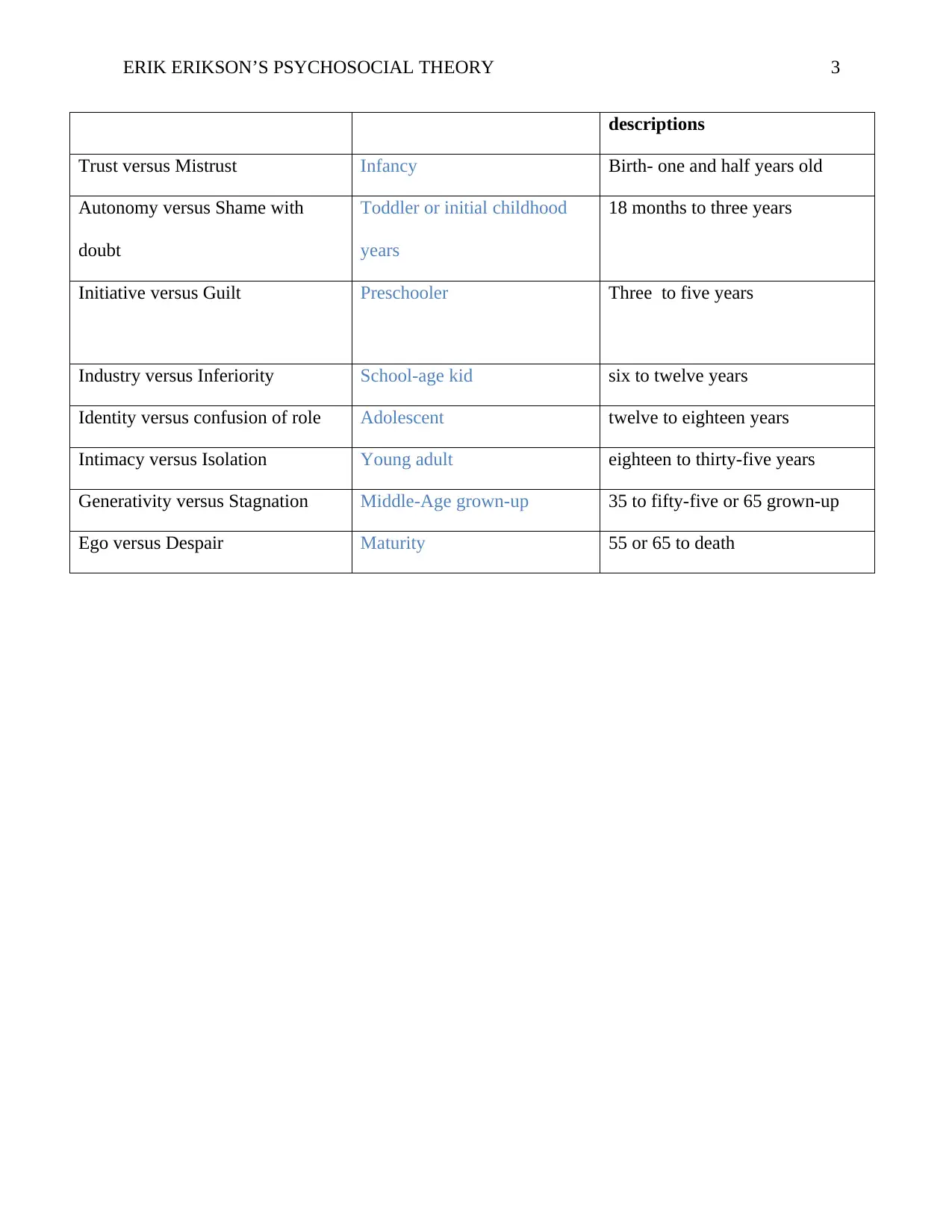
ERIK ERIKSON’S PSYCHOSOCIAL THEORY 3
descriptions
Trust versus Mistrust Infancy Birth- one and half years old
Autonomy versus Shame with
doubt
Toddler or initial childhood
years
18 months to three years
Initiative versus Guilt Preschooler Three to five years
Industry versus Inferiority School-age kid six to twelve years
Identity versus confusion of role Adolescent twelve to eighteen years
Intimacy versus Isolation Young adult eighteen to thirty-five years
Generativity versus Stagnation Middle-Age grown-up 35 to fifty-five or 65 grown-up
Ego versus Despair Maturity 55 or 65 to death
descriptions
Trust versus Mistrust Infancy Birth- one and half years old
Autonomy versus Shame with
doubt
Toddler or initial childhood
years
18 months to three years
Initiative versus Guilt Preschooler Three to five years
Industry versus Inferiority School-age kid six to twelve years
Identity versus confusion of role Adolescent twelve to eighteen years
Intimacy versus Isolation Young adult eighteen to thirty-five years
Generativity versus Stagnation Middle-Age grown-up 35 to fifty-five or 65 grown-up
Ego versus Despair Maturity 55 or 65 to death
⊘ This is a preview!⊘
Do you want full access?
Subscribe today to unlock all pages.

Trusted by 1+ million students worldwide
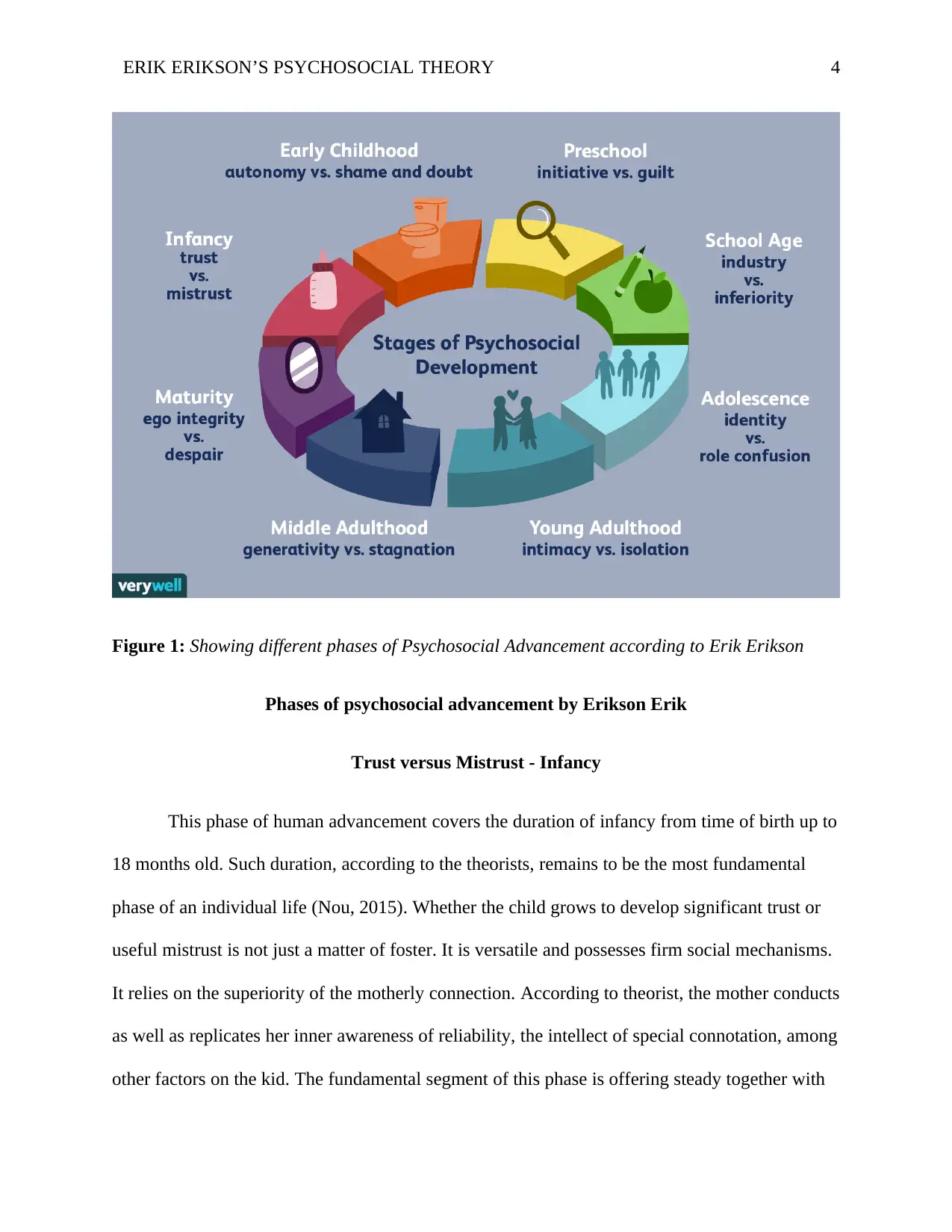
ERIK ERIKSON’S PSYCHOSOCIAL THEORY 4
Figure 1: Showing different phases of Psychosocial Advancement according to Erik Erikson
Phases of psychosocial advancement by Erikson Erik
Trust versus Mistrust - Infancy
This phase of human advancement covers the duration of infancy from time of birth up to
18 months old. Such duration, according to the theorists, remains to be the most fundamental
phase of an individual life (Nou, 2015). Whether the child grows to develop significant trust or
useful mistrust is not just a matter of foster. It is versatile and possesses firm social mechanisms.
It relies on the superiority of the motherly connection. According to theorist, the mother conducts
as well as replicates her inner awareness of reliability, the intellect of special connotation, among
other factors on the kid. The fundamental segment of this phase is offering steady together with
Figure 1: Showing different phases of Psychosocial Advancement according to Erik Erikson
Phases of psychosocial advancement by Erikson Erik
Trust versus Mistrust - Infancy
This phase of human advancement covers the duration of infancy from time of birth up to
18 months old. Such duration, according to the theorists, remains to be the most fundamental
phase of an individual life (Nou, 2015). Whether the child grows to develop significant trust or
useful mistrust is not just a matter of foster. It is versatile and possesses firm social mechanisms.
It relies on the superiority of the motherly connection. According to theorist, the mother conducts
as well as replicates her inner awareness of reliability, the intellect of special connotation, among
other factors on the kid. The fundamental segment of this phase is offering steady together with
Paraphrase This Document
Need a fresh take? Get an instant paraphrase of this document with our AI Paraphraser
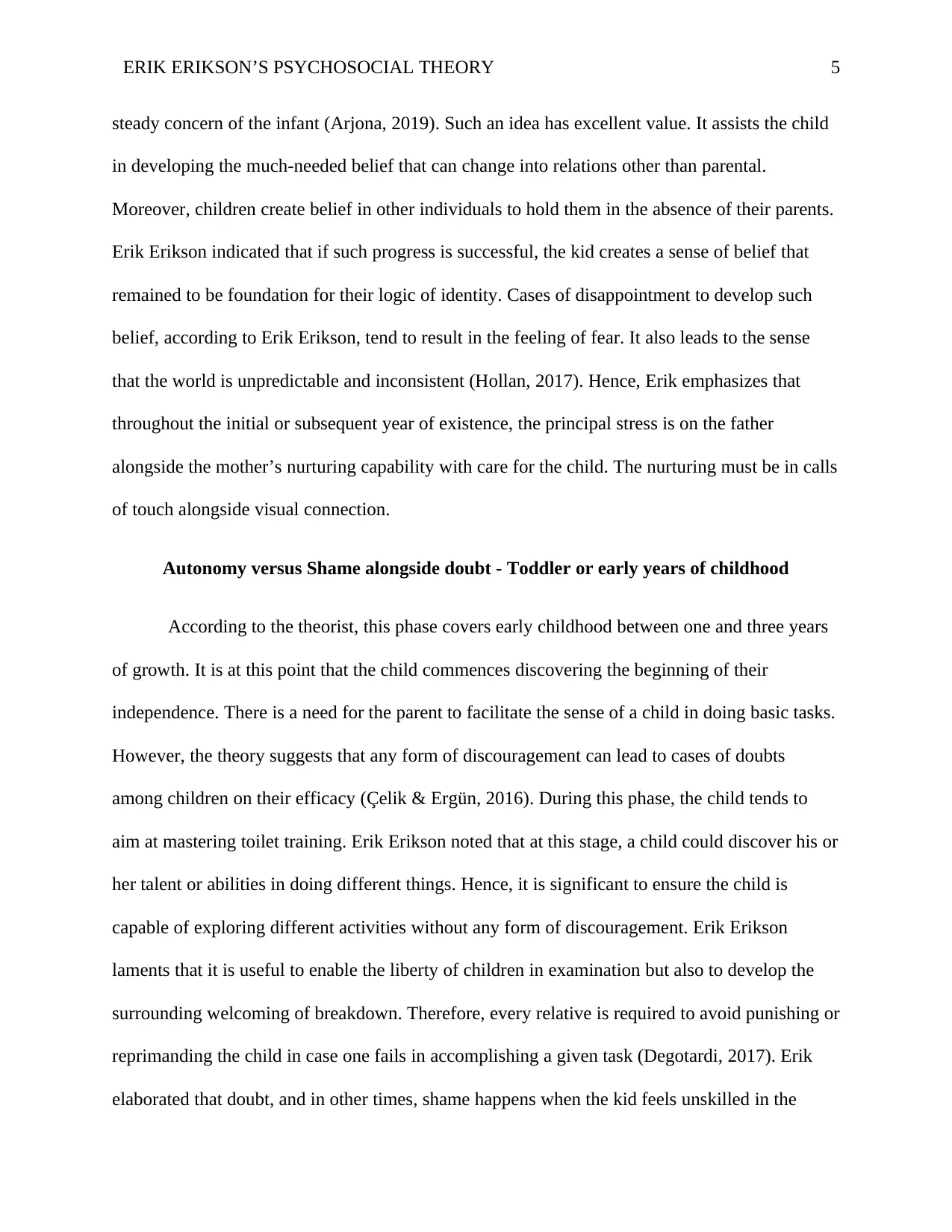
ERIK ERIKSON’S PSYCHOSOCIAL THEORY 5
steady concern of the infant (Arjona, 2019). Such an idea has excellent value. It assists the child
in developing the much-needed belief that can change into relations other than parental.
Moreover, children create belief in other individuals to hold them in the absence of their parents.
Erik Erikson indicated that if such progress is successful, the kid creates a sense of belief that
remained to be foundation for their logic of identity. Cases of disappointment to develop such
belief, according to Erik Erikson, tend to result in the feeling of fear. It also leads to the sense
that the world is unpredictable and inconsistent (Hollan, 2017). Hence, Erik emphasizes that
throughout the initial or subsequent year of existence, the principal stress is on the father
alongside the mother’s nurturing capability with care for the child. The nurturing must be in calls
of touch alongside visual connection.
Autonomy versus Shame alongside doubt - Toddler or early years of childhood
According to the theorist, this phase covers early childhood between one and three years
of growth. It is at this point that the child commences discovering the beginning of their
independence. There is a need for the parent to facilitate the sense of a child in doing basic tasks.
However, the theory suggests that any form of discouragement can lead to cases of doubts
among children on their efficacy (Çelik & Ergün, 2016). During this phase, the child tends to
aim at mastering toilet training. Erik Erikson noted that at this stage, a child could discover his or
her talent or abilities in doing different things. Hence, it is significant to ensure the child is
capable of exploring different activities without any form of discouragement. Erik Erikson
laments that it is useful to enable the liberty of children in examination but also to develop the
surrounding welcoming of breakdown. Therefore, every relative is required to avoid punishing or
reprimanding the child in case one fails in accomplishing a given task (Degotardi, 2017). Erik
elaborated that doubt, and in other times, shame happens when the kid feels unskilled in the
steady concern of the infant (Arjona, 2019). Such an idea has excellent value. It assists the child
in developing the much-needed belief that can change into relations other than parental.
Moreover, children create belief in other individuals to hold them in the absence of their parents.
Erik Erikson indicated that if such progress is successful, the kid creates a sense of belief that
remained to be foundation for their logic of identity. Cases of disappointment to develop such
belief, according to Erik Erikson, tend to result in the feeling of fear. It also leads to the sense
that the world is unpredictable and inconsistent (Hollan, 2017). Hence, Erik emphasizes that
throughout the initial or subsequent year of existence, the principal stress is on the father
alongside the mother’s nurturing capability with care for the child. The nurturing must be in calls
of touch alongside visual connection.
Autonomy versus Shame alongside doubt - Toddler or early years of childhood
According to the theorist, this phase covers early childhood between one and three years
of growth. It is at this point that the child commences discovering the beginning of their
independence. There is a need for the parent to facilitate the sense of a child in doing basic tasks.
However, the theory suggests that any form of discouragement can lead to cases of doubts
among children on their efficacy (Çelik & Ergün, 2016). During this phase, the child tends to
aim at mastering toilet training. Erik Erikson noted that at this stage, a child could discover his or
her talent or abilities in doing different things. Hence, it is significant to ensure the child is
capable of exploring different activities without any form of discouragement. Erik Erikson
laments that it is useful to enable the liberty of children in examination but also to develop the
surrounding welcoming of breakdown. Therefore, every relative is required to avoid punishing or
reprimanding the child in case one fails in accomplishing a given task (Degotardi, 2017). Erik
elaborated that doubt, and in other times, shame happens when the kid feels unskilled in the
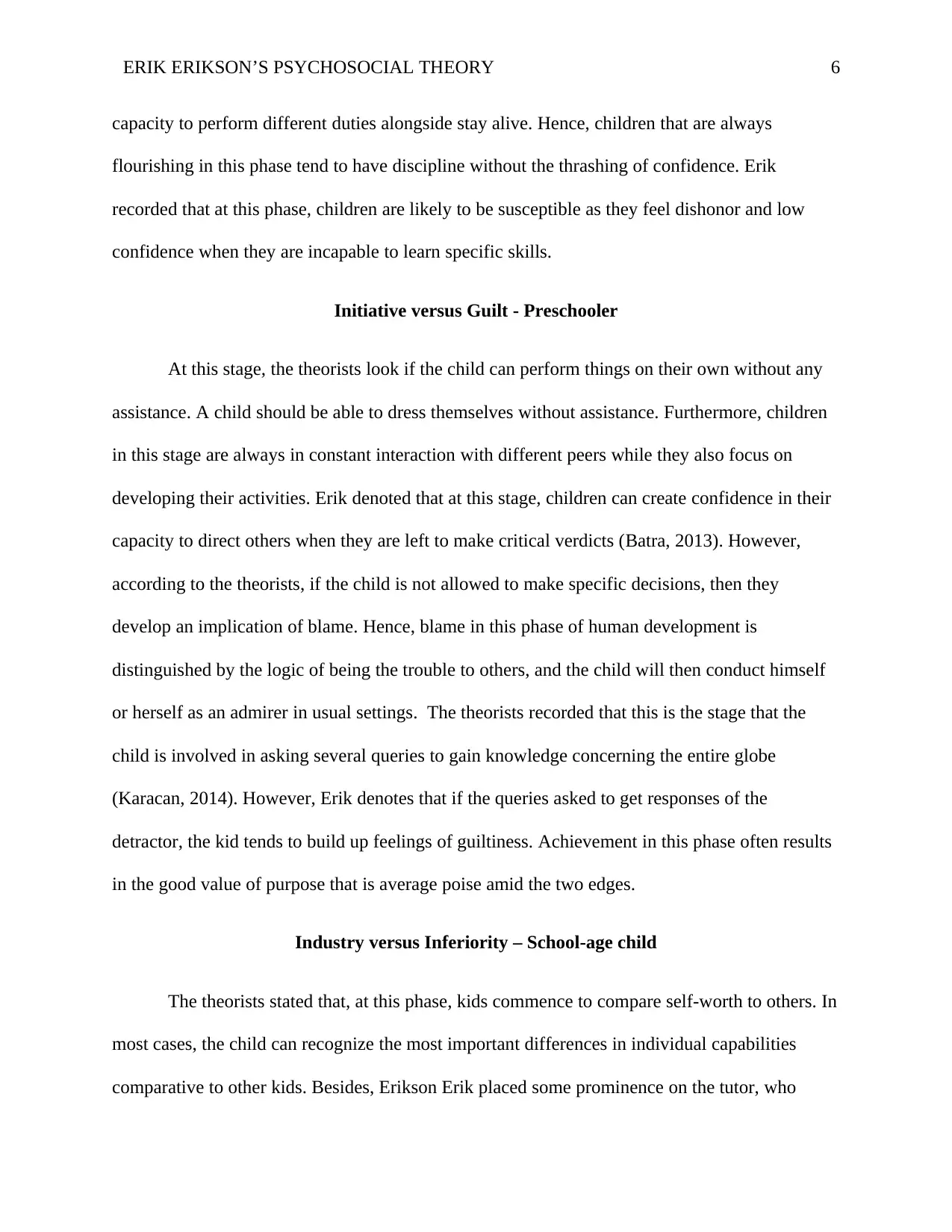
ERIK ERIKSON’S PSYCHOSOCIAL THEORY 6
capacity to perform different duties alongside stay alive. Hence, children that are always
flourishing in this phase tend to have discipline without the thrashing of confidence. Erik
recorded that at this phase, children are likely to be susceptible as they feel dishonor and low
confidence when they are incapable to learn specific skills.
Initiative versus Guilt - Preschooler
At this stage, the theorists look if the child can perform things on their own without any
assistance. A child should be able to dress themselves without assistance. Furthermore, children
in this stage are always in constant interaction with different peers while they also focus on
developing their activities. Erik denoted that at this stage, children can create confidence in their
capacity to direct others when they are left to make critical verdicts (Batra, 2013). However,
according to the theorists, if the child is not allowed to make specific decisions, then they
develop an implication of blame. Hence, blame in this phase of human development is
distinguished by the logic of being the trouble to others, and the child will then conduct himself
or herself as an admirer in usual settings. The theorists recorded that this is the stage that the
child is involved in asking several queries to gain knowledge concerning the entire globe
(Karacan, 2014). However, Erik denotes that if the queries asked to get responses of the
detractor, the kid tends to build up feelings of guiltiness. Achievement in this phase often results
in the good value of purpose that is average poise amid the two edges.
Industry versus Inferiority – School-age child
The theorists stated that, at this phase, kids commence to compare self-worth to others. In
most cases, the child can recognize the most important differences in individual capabilities
comparative to other kids. Besides, Erikson Erik placed some prominence on the tutor, who
capacity to perform different duties alongside stay alive. Hence, children that are always
flourishing in this phase tend to have discipline without the thrashing of confidence. Erik
recorded that at this phase, children are likely to be susceptible as they feel dishonor and low
confidence when they are incapable to learn specific skills.
Initiative versus Guilt - Preschooler
At this stage, the theorists look if the child can perform things on their own without any
assistance. A child should be able to dress themselves without assistance. Furthermore, children
in this stage are always in constant interaction with different peers while they also focus on
developing their activities. Erik denoted that at this stage, children can create confidence in their
capacity to direct others when they are left to make critical verdicts (Batra, 2013). However,
according to the theorists, if the child is not allowed to make specific decisions, then they
develop an implication of blame. Hence, blame in this phase of human development is
distinguished by the logic of being the trouble to others, and the child will then conduct himself
or herself as an admirer in usual settings. The theorists recorded that this is the stage that the
child is involved in asking several queries to gain knowledge concerning the entire globe
(Karacan, 2014). However, Erik denotes that if the queries asked to get responses of the
detractor, the kid tends to build up feelings of guiltiness. Achievement in this phase often results
in the good value of purpose that is average poise amid the two edges.
Industry versus Inferiority – School-age child
The theorists stated that, at this phase, kids commence to compare self-worth to others. In
most cases, the child can recognize the most important differences in individual capabilities
comparative to other kids. Besides, Erikson Erik placed some prominence on the tutor, who
⊘ This is a preview!⊘
Do you want full access?
Subscribe today to unlock all pages.

Trusted by 1+ million students worldwide
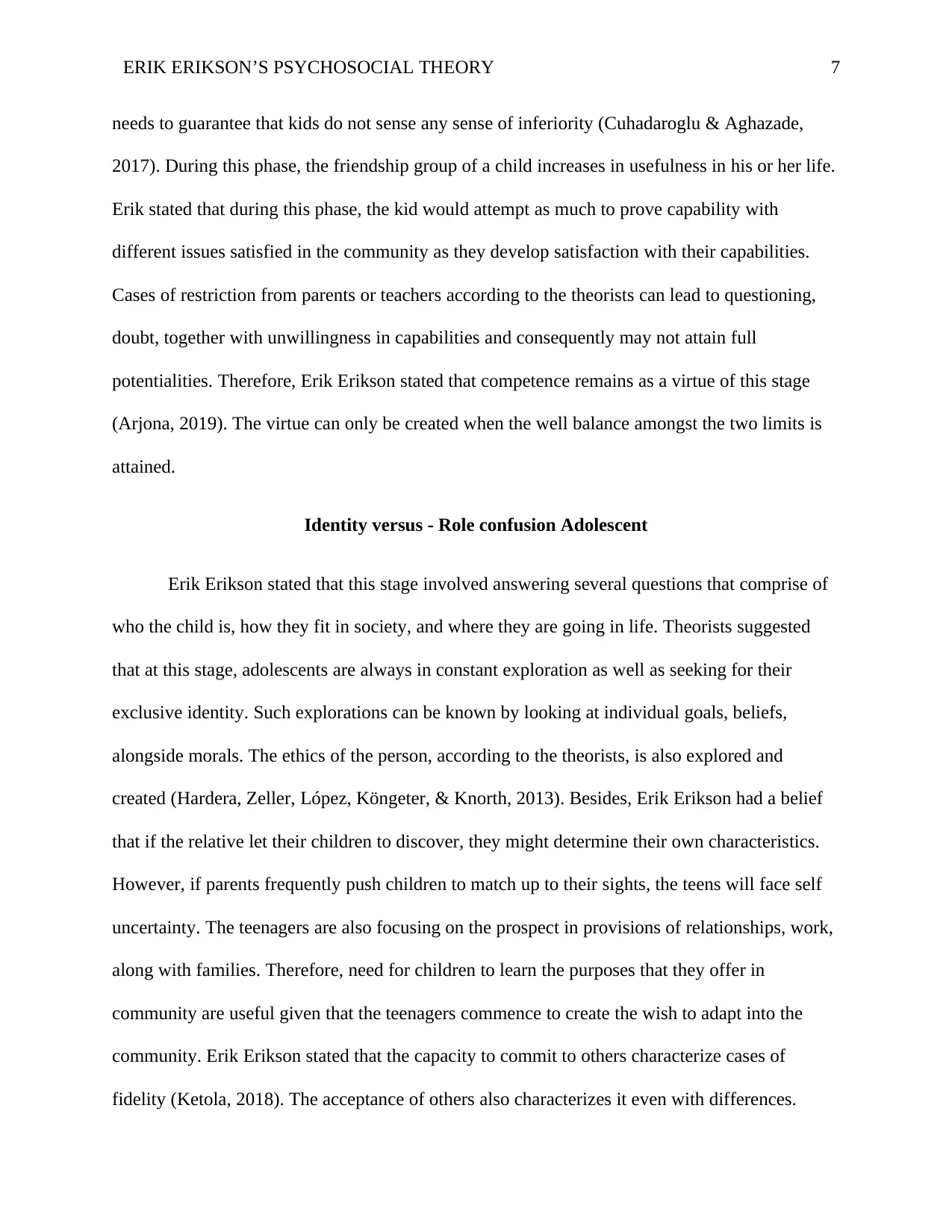
ERIK ERIKSON’S PSYCHOSOCIAL THEORY 7
needs to guarantee that kids do not sense any sense of inferiority (Cuhadaroglu & Aghazade,
2017). During this phase, the friendship group of a child increases in usefulness in his or her life.
Erik stated that during this phase, the kid would attempt as much to prove capability with
different issues satisfied in the community as they develop satisfaction with their capabilities.
Cases of restriction from parents or teachers according to the theorists can lead to questioning,
doubt, together with unwillingness in capabilities and consequently may not attain full
potentialities. Therefore, Erik Erikson stated that competence remains as a virtue of this stage
(Arjona, 2019). The virtue can only be created when the well balance amongst the two limits is
attained.
Identity versus - Role confusion Adolescent
Erik Erikson stated that this stage involved answering several questions that comprise of
who the child is, how they fit in society, and where they are going in life. Theorists suggested
that at this stage, adolescents are always in constant exploration as well as seeking for their
exclusive identity. Such explorations can be known by looking at individual goals, beliefs,
alongside morals. The ethics of the person, according to the theorists, is also explored and
created (Hardera, Zeller, López, Köngeter, & Knorth, 2013). Besides, Erik Erikson had a belief
that if the relative let their children to discover, they might determine their own characteristics.
However, if parents frequently push children to match up to their sights, the teens will face self
uncertainty. The teenagers are also focusing on the prospect in provisions of relationships, work,
along with families. Therefore, need for children to learn the purposes that they offer in
community are useful given that the teenagers commence to create the wish to adapt into the
community. Erik Erikson stated that the capacity to commit to others characterize cases of
fidelity (Ketola, 2018). The acceptance of others also characterizes it even with differences.
needs to guarantee that kids do not sense any sense of inferiority (Cuhadaroglu & Aghazade,
2017). During this phase, the friendship group of a child increases in usefulness in his or her life.
Erik stated that during this phase, the kid would attempt as much to prove capability with
different issues satisfied in the community as they develop satisfaction with their capabilities.
Cases of restriction from parents or teachers according to the theorists can lead to questioning,
doubt, together with unwillingness in capabilities and consequently may not attain full
potentialities. Therefore, Erik Erikson stated that competence remains as a virtue of this stage
(Arjona, 2019). The virtue can only be created when the well balance amongst the two limits is
attained.
Identity versus - Role confusion Adolescent
Erik Erikson stated that this stage involved answering several questions that comprise of
who the child is, how they fit in society, and where they are going in life. Theorists suggested
that at this stage, adolescents are always in constant exploration as well as seeking for their
exclusive identity. Such explorations can be known by looking at individual goals, beliefs,
alongside morals. The ethics of the person, according to the theorists, is also explored and
created (Hardera, Zeller, López, Köngeter, & Knorth, 2013). Besides, Erik Erikson had a belief
that if the relative let their children to discover, they might determine their own characteristics.
However, if parents frequently push children to match up to their sights, the teens will face self
uncertainty. The teenagers are also focusing on the prospect in provisions of relationships, work,
along with families. Therefore, need for children to learn the purposes that they offer in
community are useful given that the teenagers commence to create the wish to adapt into the
community. Erik Erikson stated that the capacity to commit to others characterize cases of
fidelity (Ketola, 2018). The acceptance of others also characterizes it even with differences.
Paraphrase This Document
Need a fresh take? Get an instant paraphrase of this document with our AI Paraphraser
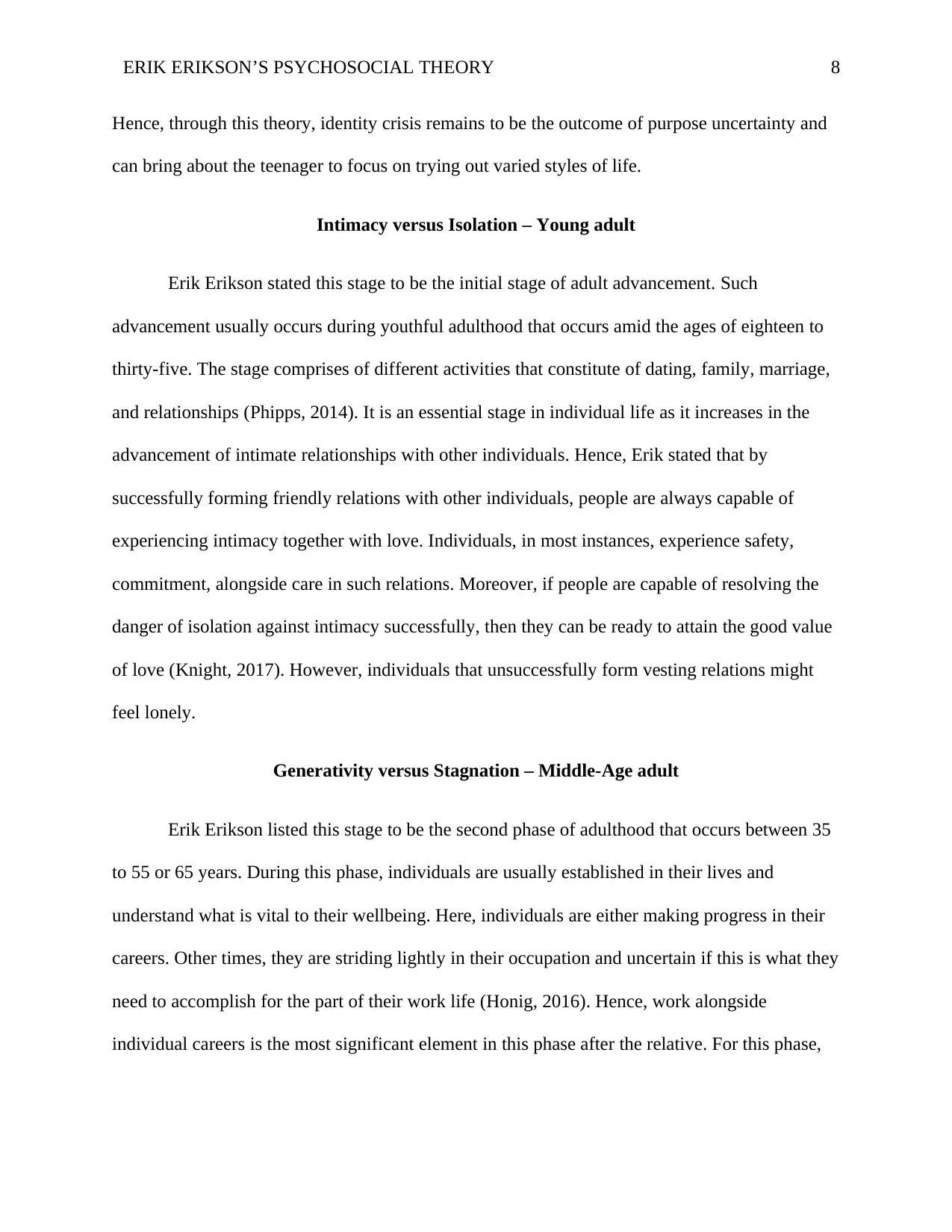
ERIK ERIKSON’S PSYCHOSOCIAL THEORY 8
Hence, through this theory, identity crisis remains to be the outcome of purpose uncertainty and
can bring about the teenager to focus on trying out varied styles of life.
Intimacy versus Isolation – Young adult
Erik Erikson stated this stage to be the initial stage of adult advancement. Such
advancement usually occurs during youthful adulthood that occurs amid the ages of eighteen to
thirty-five. The stage comprises of different activities that constitute of dating, family, marriage,
and relationships (Phipps, 2014). It is an essential stage in individual life as it increases in the
advancement of intimate relationships with other individuals. Hence, Erik stated that by
successfully forming friendly relations with other individuals, people are always capable of
experiencing intimacy together with love. Individuals, in most instances, experience safety,
commitment, alongside care in such relations. Moreover, if people are capable of resolving the
danger of isolation against intimacy successfully, then they can be ready to attain the good value
of love (Knight, 2017). However, individuals that unsuccessfully form vesting relations might
feel lonely.
Generativity versus Stagnation – Middle-Age adult
Erik Erikson listed this stage to be the second phase of adulthood that occurs between 35
to 55 or 65 years. During this phase, individuals are usually established in their lives and
understand what is vital to their wellbeing. Here, individuals are either making progress in their
careers. Other times, they are striding lightly in their occupation and uncertain if this is what they
need to accomplish for the part of their work life (Honig, 2016). Hence, work alongside
individual careers is the most significant element in this phase after the relative. For this phase,
Hence, through this theory, identity crisis remains to be the outcome of purpose uncertainty and
can bring about the teenager to focus on trying out varied styles of life.
Intimacy versus Isolation – Young adult
Erik Erikson stated this stage to be the initial stage of adult advancement. Such
advancement usually occurs during youthful adulthood that occurs amid the ages of eighteen to
thirty-five. The stage comprises of different activities that constitute of dating, family, marriage,
and relationships (Phipps, 2014). It is an essential stage in individual life as it increases in the
advancement of intimate relationships with other individuals. Hence, Erik stated that by
successfully forming friendly relations with other individuals, people are always capable of
experiencing intimacy together with love. Individuals, in most instances, experience safety,
commitment, alongside care in such relations. Moreover, if people are capable of resolving the
danger of isolation against intimacy successfully, then they can be ready to attain the good value
of love (Knight, 2017). However, individuals that unsuccessfully form vesting relations might
feel lonely.
Generativity versus Stagnation – Middle-Age adult
Erik Erikson listed this stage to be the second phase of adulthood that occurs between 35
to 55 or 65 years. During this phase, individuals are usually established in their lives and
understand what is vital to their wellbeing. Here, individuals are either making progress in their
careers. Other times, they are striding lightly in their occupation and uncertain if this is what they
need to accomplish for the part of their work life (Honig, 2016). Hence, work alongside
individual careers is the most significant element in this phase after the relative. For this phase,
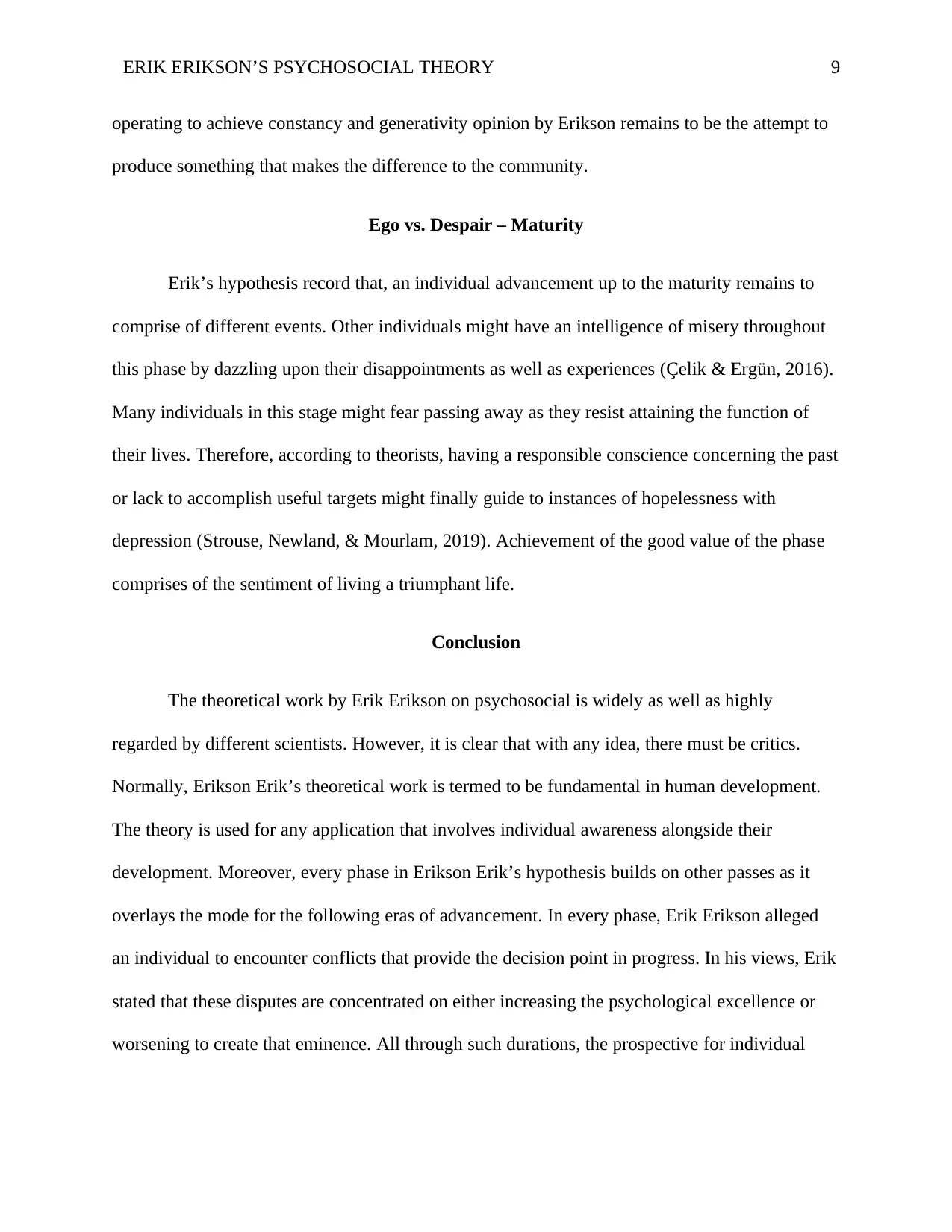
ERIK ERIKSON’S PSYCHOSOCIAL THEORY 9
operating to achieve constancy and generativity opinion by Erikson remains to be the attempt to
produce something that makes the difference to the community.
Ego vs. Despair – Maturity
Erik’s hypothesis record that, an individual advancement up to the maturity remains to
comprise of different events. Other individuals might have an intelligence of misery throughout
this phase by dazzling upon their disappointments as well as experiences (Çelik & Ergün, 2016).
Many individuals in this stage might fear passing away as they resist attaining the function of
their lives. Therefore, according to theorists, having a responsible conscience concerning the past
or lack to accomplish useful targets might finally guide to instances of hopelessness with
depression (Strouse, Newland, & Mourlam, 2019). Achievement of the good value of the phase
comprises of the sentiment of living a triumphant life.
Conclusion
The theoretical work by Erik Erikson on psychosocial is widely as well as highly
regarded by different scientists. However, it is clear that with any idea, there must be critics.
Normally, Erikson Erik’s theoretical work is termed to be fundamental in human development.
The theory is used for any application that involves individual awareness alongside their
development. Moreover, every phase in Erikson Erik’s hypothesis builds on other passes as it
overlays the mode for the following eras of advancement. In every phase, Erik Erikson alleged
an individual to encounter conflicts that provide the decision point in progress. In his views, Erik
stated that these disputes are concentrated on either increasing the psychological excellence or
worsening to create that eminence. All through such durations, the prospective for individual
operating to achieve constancy and generativity opinion by Erikson remains to be the attempt to
produce something that makes the difference to the community.
Ego vs. Despair – Maturity
Erik’s hypothesis record that, an individual advancement up to the maturity remains to
comprise of different events. Other individuals might have an intelligence of misery throughout
this phase by dazzling upon their disappointments as well as experiences (Çelik & Ergün, 2016).
Many individuals in this stage might fear passing away as they resist attaining the function of
their lives. Therefore, according to theorists, having a responsible conscience concerning the past
or lack to accomplish useful targets might finally guide to instances of hopelessness with
depression (Strouse, Newland, & Mourlam, 2019). Achievement of the good value of the phase
comprises of the sentiment of living a triumphant life.
Conclusion
The theoretical work by Erik Erikson on psychosocial is widely as well as highly
regarded by different scientists. However, it is clear that with any idea, there must be critics.
Normally, Erikson Erik’s theoretical work is termed to be fundamental in human development.
The theory is used for any application that involves individual awareness alongside their
development. Moreover, every phase in Erikson Erik’s hypothesis builds on other passes as it
overlays the mode for the following eras of advancement. In every phase, Erik Erikson alleged
an individual to encounter conflicts that provide the decision point in progress. In his views, Erik
stated that these disputes are concentrated on either increasing the psychological excellence or
worsening to create that eminence. All through such durations, the prospective for individual
⊘ This is a preview!⊘
Do you want full access?
Subscribe today to unlock all pages.

Trusted by 1+ million students worldwide
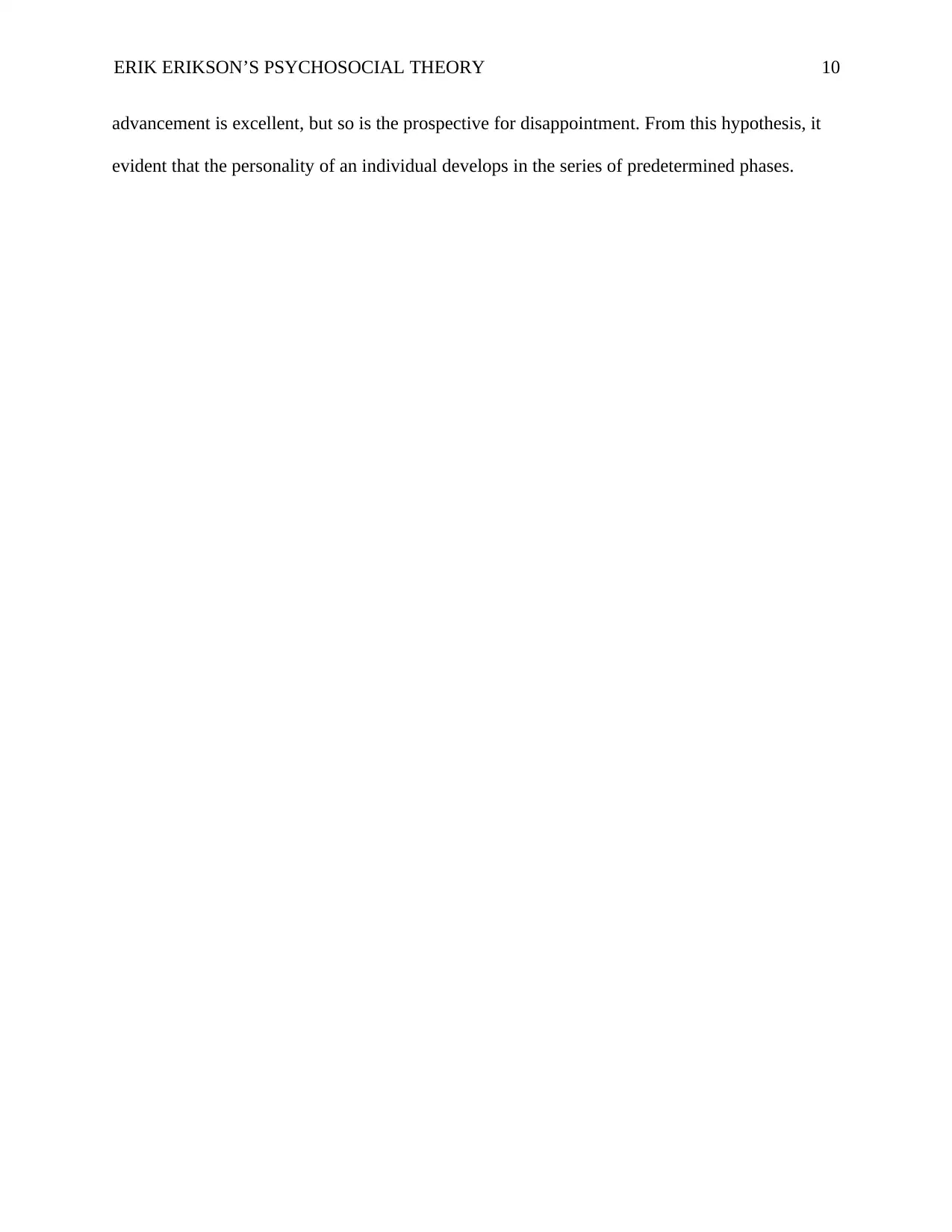
ERIK ERIKSON’S PSYCHOSOCIAL THEORY 10
advancement is excellent, but so is the prospective for disappointment. From this hypothesis, it
evident that the personality of an individual develops in the series of predetermined phases.
advancement is excellent, but so is the prospective for disappointment. From this hypothesis, it
evident that the personality of an individual develops in the series of predetermined phases.
Paraphrase This Document
Need a fresh take? Get an instant paraphrase of this document with our AI Paraphraser
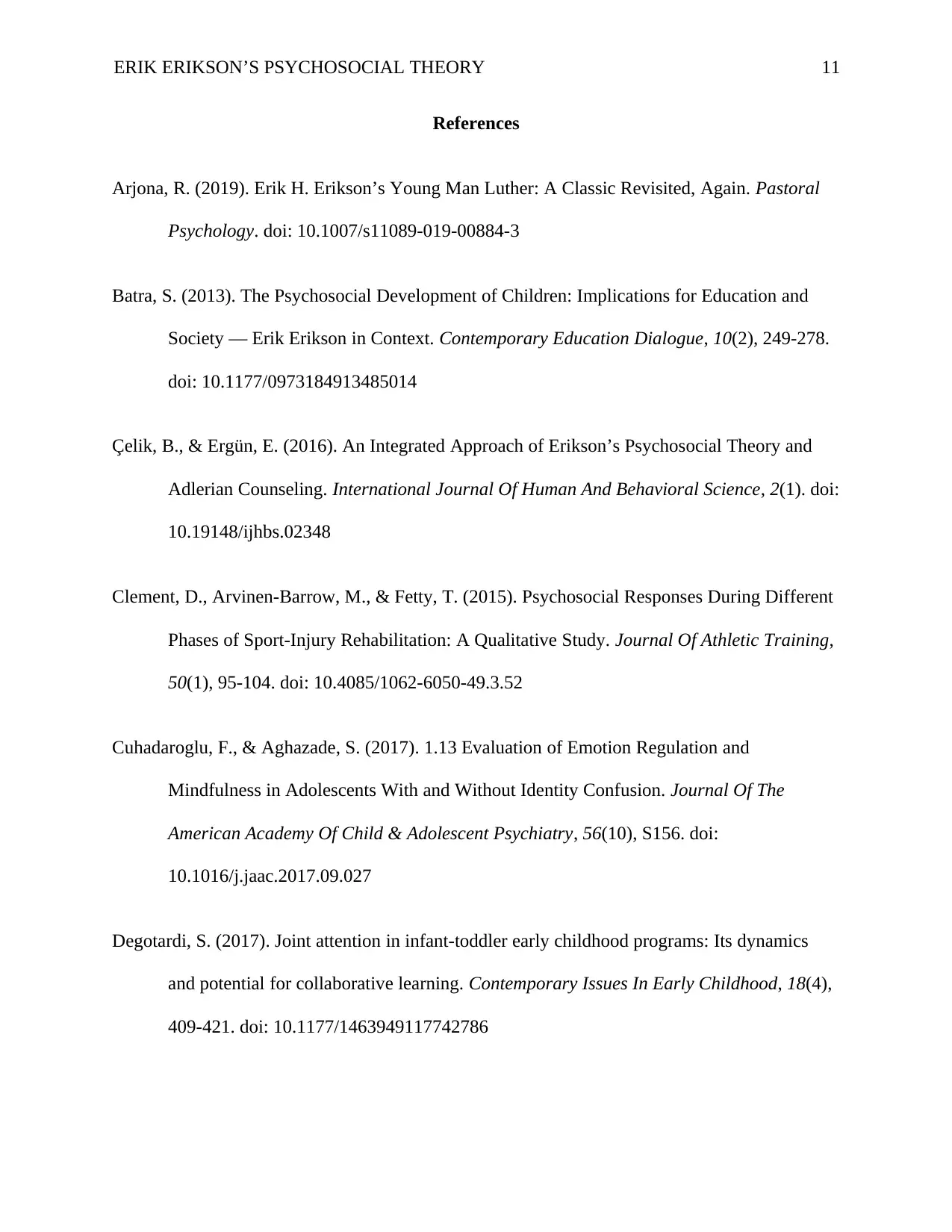
ERIK ERIKSON’S PSYCHOSOCIAL THEORY 11
References
Arjona, R. (2019). Erik H. Erikson’s Young Man Luther: A Classic Revisited, Again. Pastoral
Psychology. doi: 10.1007/s11089-019-00884-3
Batra, S. (2013). The Psychosocial Development of Children: Implications for Education and
Society — Erik Erikson in Context. Contemporary Education Dialogue, 10(2), 249-278.
doi: 10.1177/0973184913485014
Çelik, B., & Ergün, E. (2016). An Integrated Approach of Erikson’s Psychosocial Theory and
Adlerian Counseling. International Journal Of Human And Behavioral Science, 2(1). doi:
10.19148/ijhbs.02348
Clement, D., Arvinen-Barrow, M., & Fetty, T. (2015). Psychosocial Responses During Different
Phases of Sport-Injury Rehabilitation: A Qualitative Study. Journal Of Athletic Training,
50(1), 95-104. doi: 10.4085/1062-6050-49.3.52
Cuhadaroglu, F., & Aghazade, S. (2017). 1.13 Evaluation of Emotion Regulation and
Mindfulness in Adolescents With and Without Identity Confusion. Journal Of The
American Academy Of Child & Adolescent Psychiatry, 56(10), S156. doi:
10.1016/j.jaac.2017.09.027
Degotardi, S. (2017). Joint attention in infant-toddler early childhood programs: Its dynamics
and potential for collaborative learning. Contemporary Issues In Early Childhood, 18(4),
409-421. doi: 10.1177/1463949117742786
References
Arjona, R. (2019). Erik H. Erikson’s Young Man Luther: A Classic Revisited, Again. Pastoral
Psychology. doi: 10.1007/s11089-019-00884-3
Batra, S. (2013). The Psychosocial Development of Children: Implications for Education and
Society — Erik Erikson in Context. Contemporary Education Dialogue, 10(2), 249-278.
doi: 10.1177/0973184913485014
Çelik, B., & Ergün, E. (2016). An Integrated Approach of Erikson’s Psychosocial Theory and
Adlerian Counseling. International Journal Of Human And Behavioral Science, 2(1). doi:
10.19148/ijhbs.02348
Clement, D., Arvinen-Barrow, M., & Fetty, T. (2015). Psychosocial Responses During Different
Phases of Sport-Injury Rehabilitation: A Qualitative Study. Journal Of Athletic Training,
50(1), 95-104. doi: 10.4085/1062-6050-49.3.52
Cuhadaroglu, F., & Aghazade, S. (2017). 1.13 Evaluation of Emotion Regulation and
Mindfulness in Adolescents With and Without Identity Confusion. Journal Of The
American Academy Of Child & Adolescent Psychiatry, 56(10), S156. doi:
10.1016/j.jaac.2017.09.027
Degotardi, S. (2017). Joint attention in infant-toddler early childhood programs: Its dynamics
and potential for collaborative learning. Contemporary Issues In Early Childhood, 18(4),
409-421. doi: 10.1177/1463949117742786
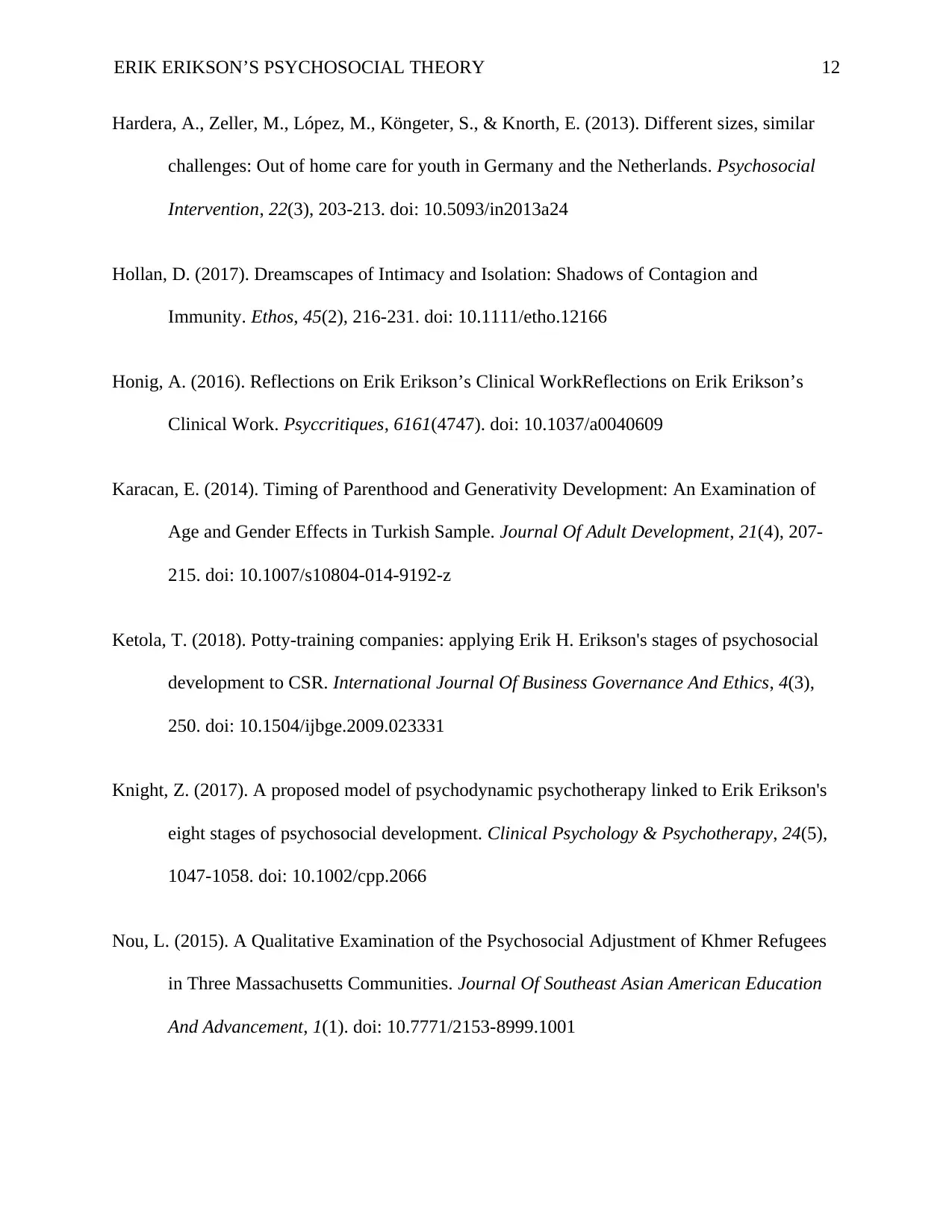
ERIK ERIKSON’S PSYCHOSOCIAL THEORY 12
Hardera, A., Zeller, M., López, M., Köngeter, S., & Knorth, E. (2013). Different sizes, similar
challenges: Out of home care for youth in Germany and the Netherlands. Psychosocial
Intervention, 22(3), 203-213. doi: 10.5093/in2013a24
Hollan, D. (2017). Dreamscapes of Intimacy and Isolation: Shadows of Contagion and
Immunity. Ethos, 45(2), 216-231. doi: 10.1111/etho.12166
Honig, A. (2016). Reflections on Erik Erikson’s Clinical WorkReflections on Erik Erikson’s
Clinical Work. Psyccritiques, 6161(4747). doi: 10.1037/a0040609
Karacan, E. (2014). Timing of Parenthood and Generativity Development: An Examination of
Age and Gender Effects in Turkish Sample. Journal Of Adult Development, 21(4), 207-
215. doi: 10.1007/s10804-014-9192-z
Ketola, T. (2018). Potty-training companies: applying Erik H. Erikson's stages of psychosocial
development to CSR. International Journal Of Business Governance And Ethics, 4(3),
250. doi: 10.1504/ijbge.2009.023331
Knight, Z. (2017). A proposed model of psychodynamic psychotherapy linked to Erik Erikson's
eight stages of psychosocial development. Clinical Psychology & Psychotherapy, 24(5),
1047-1058. doi: 10.1002/cpp.2066
Nou, L. (2015). A Qualitative Examination of the Psychosocial Adjustment of Khmer Refugees
in Three Massachusetts Communities. Journal Of Southeast Asian American Education
And Advancement, 1(1). doi: 10.7771/2153-8999.1001
Hardera, A., Zeller, M., López, M., Köngeter, S., & Knorth, E. (2013). Different sizes, similar
challenges: Out of home care for youth in Germany and the Netherlands. Psychosocial
Intervention, 22(3), 203-213. doi: 10.5093/in2013a24
Hollan, D. (2017). Dreamscapes of Intimacy and Isolation: Shadows of Contagion and
Immunity. Ethos, 45(2), 216-231. doi: 10.1111/etho.12166
Honig, A. (2016). Reflections on Erik Erikson’s Clinical WorkReflections on Erik Erikson’s
Clinical Work. Psyccritiques, 6161(4747). doi: 10.1037/a0040609
Karacan, E. (2014). Timing of Parenthood and Generativity Development: An Examination of
Age and Gender Effects in Turkish Sample. Journal Of Adult Development, 21(4), 207-
215. doi: 10.1007/s10804-014-9192-z
Ketola, T. (2018). Potty-training companies: applying Erik H. Erikson's stages of psychosocial
development to CSR. International Journal Of Business Governance And Ethics, 4(3),
250. doi: 10.1504/ijbge.2009.023331
Knight, Z. (2017). A proposed model of psychodynamic psychotherapy linked to Erik Erikson's
eight stages of psychosocial development. Clinical Psychology & Psychotherapy, 24(5),
1047-1058. doi: 10.1002/cpp.2066
Nou, L. (2015). A Qualitative Examination of the Psychosocial Adjustment of Khmer Refugees
in Three Massachusetts Communities. Journal Of Southeast Asian American Education
And Advancement, 1(1). doi: 10.7771/2153-8999.1001
⊘ This is a preview!⊘
Do you want full access?
Subscribe today to unlock all pages.

Trusted by 1+ million students worldwide
1 out of 13
Related Documents
Your All-in-One AI-Powered Toolkit for Academic Success.
+13062052269
info@desklib.com
Available 24*7 on WhatsApp / Email
![[object Object]](/_next/static/media/star-bottom.7253800d.svg)
Unlock your academic potential
Copyright © 2020–2026 A2Z Services. All Rights Reserved. Developed and managed by ZUCOL.





